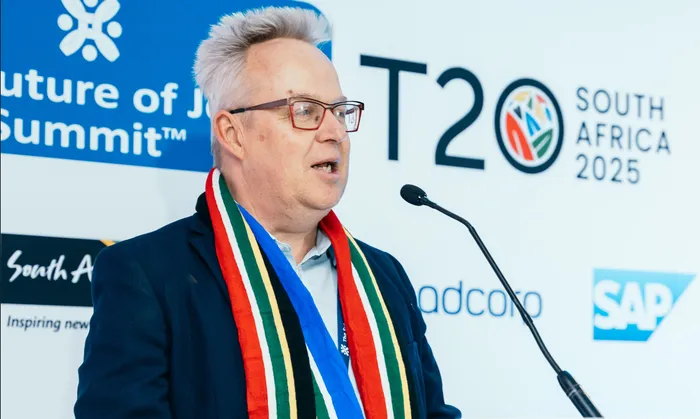South Africa’s next global export: 10 million young minds

Dr Nik Eberl is the Founder & Executive Chair: The Future of Jobs Summit™ (Official T20 Side Event) .He will be writing a regular column in Business Report.
Image: Supplied
South Africa’s greatest untapped resource is not buried beneath our soil - it is the 10 million young people who stand at the gateway to adulthood, eager to contribute but too often locked out of the world of work. The debate has rightly focused on education, training, and skills. But there is a harder, less glamorous question we need to answer: how do we connect our youth to actual opportunities in the global economy?
Beyond Skills: The Access Gap
Today, the barriers facing South African youth are not only about what they know but who they can reach. A young coder in Khayelitsha, a designer in Soweto, or a logistics talent in Durban may be technically trained, but without connections to employers in Lagos, London, or Los Angeles, their skills gather dust.
Global work opportunities increasingly sit on platforms, in distributed teams, and in fast-scaling industries that thrive on digital connectivity. Yet our approach remains too domestic. We prepare youth for the South African labour market—which is shrinking—instead of preparing them to plug into the $8 trillion global freelance and digital economy which is set to create more than 230 million new jobs by 2035.
The Playbook for Global Access
To connect 10 million South African youth to jobs worldwide by 2035, we need a national strategy that focuses less on training inputs and more on opportunity pipelines. That requires three urgent shifts:
- Build Global Gateways, Not Local Silos: We need South African platforms that function as “global export houses” for talent—digital marketplaces that actively broker our youth into international projects, internships, and contracts. This is how India became the back office of the world and how the Philippines created a booming BPO sector. South Africa can carve out niches in creative industries, green energy, fintech, and health tech.
- Diplomacy of Opportunity: Embassies should be more than political outposts; they should be job hubs. Imagine South African missions in New York, Berlin, and Dubai running “Talent Desks” that match local corporate demand with South African youth supply. Trade agreements should include mobility clauses that open pathways for digital and remote work, not just goods.
- Corporate Gateways to Global Work: Our corporates are deeply integrated into multinational supply chains. They could commit to subcontracting global workstreams to local youth talent pools—essentially acting as intermediaries. Banks, insurers, telcos, and consultancies already manage cross-border operations. Why not extend that muscle to include youth access to global assignments?
- Youth Export Brands: Just as “Made in South Africa” has branded our wine and fruit, we need a national talent brand. Germany sells engineering, India sells IT services, and South Korea sells K-pop. South Africa could position itself as the world’s hub for creative problem-solvers, exporting innovation, design, and resilience. A coordinated campaign— “Hire South African Youth”—should become a global calling card.
- One-Click Access to Global Jobs: At the most practical level, a South African graduate should be able to download an app, upload their portfolio, and instantly connect to opportunities in their sector worldwide. Think of it as LinkedIn with a passport: a gateway that verifies skills, handles payments, and ensures trust between international employers and local youth.
The Prize
The stakes are enormous. Connecting 10 million South Africans to global opportunities will not just reduce unemployment; it will inject billions of dollars in foreign income directly into township and rural economies. It will position South Africa as a net exporter of talent and ideas, not only minerals. And most importantly, it will give our youth not just jobs but dignity, networks, and global relevance.
From Policy to Urgency
We cannot wait for the slow gears of policy alone. Entrepreneurs, universities, corporates, and the South African diaspora must move first. Government’s role should be to open doors and remove friction, not to own the entire process. The youth are ready, the world is hiring, and the technology exists.
Dr Nik Eberl is the Founder & Executive Chair: The Future of Jobs Summit™ (Official T20 Side Event). He is author: Nation of Champions: How South Africa won the World Cup of Destination Branding.
*** The views expressed here do not necessarily represent those of Independent Media or IOL
BUSINESS REPORT